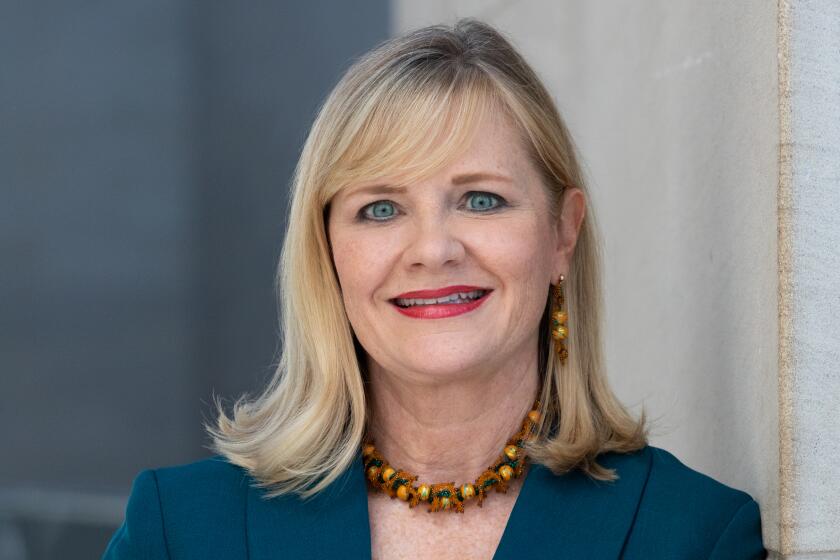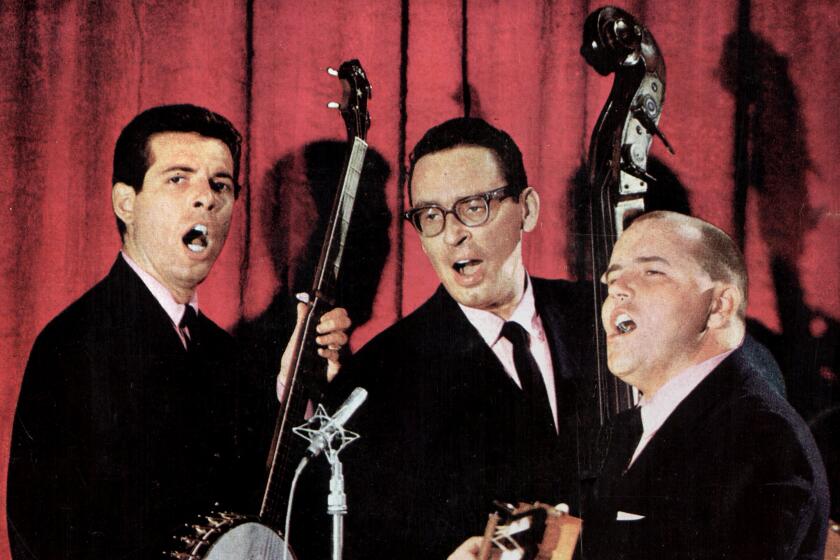Getting Their Words’ Worth : They’re 30 years into it and South Coast Repertory isn’t Broadway, but it is regarded as a ‘playwright heaven’
Jason Robards had never been to South Coast Repertory. He also had only a vague idea of where it is and couldn’t get its name quite right. But with great charm and sincerity the actor was touting the theater one day last year to a roomful of would-be actors gathered at Kennedy Center in Washington for the American College Theatre Festival.
Though Robards kept calling it “West Coast Repertory out there in Los Angeles,” he got South Coast’s reputation right. He knew that the theater is committed to staging new plays. He knew that many of them have been noticed in New York, because they get second productions there. And so his career advice was simple. “Go west,” he said, echoing Horace Greeley. “Go to West Coast Repertory.”
New York playwright Richard Greenberg, who had the way to South Coast pointed out to him in 1986 by its longtime dramaturge, Jerry Patch, understands the confusion of names. “It’s hard to keep any of them straight,” Greenberg said in a recent interview at the Costa Mesa theater, where his new play, “Night and Her Stars,” premieres Friday on the SCR Mainstage.
“My parents still call this place West Coast Repertory, and they’ve actually been here. Before I became part of it, all I knew was it was very generous. I’d heard it liked to take on playwrights, give commissions and put on first productions by a lot of interesting writers. That’s all I knew. I never knew what was San Diego (Repertory Theatre), what was La Jolla (Playhouse), what was South Coast.”
Even Craig Lucas, probably the New York playwright most closely identified with South Coast, recalls never having heard of the now-29-year-old Orange County theater company before being contacted by Patch for the first time in 1984. “I remember asking Christopher Durang about them,” he said. “Thank God, I did.”
Lucas’ plays quickly came to dominate the SCR schedule with five productions in four consecutive seasons, 1985 to 1988. There were revivals of “Reckless” and “Blue Window,” world premieres of “Three Postcards” (with music by Craig Carnelia) and “Prelude to a Kiss” (before it went to Broadway and became a Hollywood movie) and a reprise of “Marry Me a Little” (a chamber musical created from trunk songs by Stephen Sondheim).
“I received a commission from South Coast when nobody was paying much attention to me,” Lucas, 43, recounted in a recent interview from his home in Putnam County, just north of New York City. “I was not a known writer at all when we talked about a commission.
“The New York Times had completely lambasted my first play, ‘Missing Persons.’ I couldn’t even get it published. Unfortunately, theater in New York lives and dies by their reviews. ‘Reckless’ went unreviewed by them. And ‘Blue Window’ received an absolutely scathing review. . . . So I was terribly grateful for the support I got at South Coast.”
David Margulies says a commission for “Sight Unseen” turned his career around. When South Coast decided to back him, he was seriously thinking of giving up on theater. He’d already written a dozen plays, many produced but not much noticed (including one at the late, lamented Los Angeles Theatre Center and one at the Back Alley Theater).
“I owe it to South Coast that the script for ‘Sight Unseen’ exists at all,” Margulies, 39, said from New Haven, Conn., where he teaches at the Yale School of Drama. “Their commission came when I was getting involved in screenwriting and wondering if I would continue with plays. It was quite a boon, a vote of confidence. It ended up changing my life.”
Soon after its South Coast premiere in September, 1991, “Sight Unseen” was remounted by the Manhattan Theatre Club in New York and transferred to a commercial house, where it ran for seven months in 1992 as a smash hit of the Off Broadway season. The play, about the travails of a successful painter, was also nominated for the Pulitzer Prize.
Moreover, this season “Sight Unseen” is second only to David Mamet’s “Oleanna” as the most-produced new American play, with 16 professional stagings at theaters across the country, according to Dramatists Play Service, which licenses the rights for both plays. (“Oleanna” has 21.)
*
Veteran South Coast playgoers--there are 19,730 subscribers for this season, the theater’s 30th--have gotten used to seeing productions polished to a high sheen. Technical excellence, underwritten this season by a $5.8-million budget, has long been one of the theater’s hallmarks. The core acting company of five founding and two resident artists is top-notch and is regularly surrounded by guest performers of equal caliber. The resident and guest designers brought in from all over the country also rank among the best working anywhere.
But when South Coast won a special Tony Award for regional theaters in 1988, it was largely in recognition of its commitment to new plays. Of 296 productions since its first ramshackle touring show, staged from the back of a station wagon in the fall of 1964, no fewer than 53 productions have been world premieres. The overwhelming majority of those premieres--45--have come during the last 15 seasons, basically since South Coast moved into the sleek theater complex that houses its 507-seat Mainstage and 161-seat Second Stage.
The numbers are more revealing when compared with those of Southern California’s other three largest not-for-profit theaters--all regional Tony winners, as well--the Mark Taper Forum in Los Angeles (with a $10.8-million budget), the Old Globe Theatre ($8.4 million) and the La Jolla Playhouse ($4.6 million), both in San Diego.
The Taper has produced 48 world premieres since its founding in 1967, including 29 during the last 15 seasons. The Old Globe has produced 31 world premieres since its founding in 1935, including 22 in the last 15 seasons. The La Jolla Playhouse has produced 15 since current operations began in 1983.
*
For Greenberg, “Night and Her Stars” represents his second South Coast commission. The play dramatizes the TV quiz-show scandals of the late ‘50s and their chief real-life protagonists, contestants Charles Van Doren and Herb Stempel and producer Dan Enright. Written in prose but disguised on the page as blank verse, it is a cautionary tale about the twin seductions of money and fame and the corruption of basic moral values by corporate greed and all-too-human venality.
Greenberg’s first commission, in 1987, resulted in “The Extra Man,” a very different kind of work about a group of unhappy Manhattanites buffeted by urban Angst . It premiered at South Coast in 1991. By then he had already gained national attention with his best-known play, “Eastern Standard,” a witty comic satire about the post-crash ‘80s that bowed at Seattle Repertory in 1988 and made a well-publicized journey to Broadway.
“This theater has been like my convalescence,” said Greenberg, 35, who wrote “Night and Her Stars” while recovering last year from Hodgkin’s disease. “I think of my convalescence as being the way I always wanted to work. It was a utopian environment. I had no responsibilities, except to get chemo and write.”
“For us, theater is about creativity,” said producing artistic director David Emmes, 56, who co-founded South Coast with artistic director Martin Benson, 55. “It’s about transforming a play from a piece of dramatic literature into something alive on the stage, and there’s nothing more fulfilling than doing it with a new play. You’re there at the inception. The form hasn’t been created before. It’s exciting to be part of it.”
To that end, alone among comparable resident theaters anywhere in the country, South Coast has built up a $1.4-million endowment for exclusive use by its play-development program. Each year, income earned by the endowment helps underwrite the Collaboration Laboratory and its offshoots, the Hispanic Playwrights Project and the NewSCRipt readings for unproduced plays. A total of 45 commissions have been awarded to 36 writers largely since the mid-’80s, all financed by the endowment. Amounts vary, but the commissions generally range between $6,000 and $10,000.
“They’ve been very smart about how to support their commissioning process,” Taper producing director Robert Egan said. “We allocate money and try to commission four or five writers a year. But a more formalized program with a budget has existed for only the last five or six years.”
The Old Globe generally does not offer commissions. “We have done some, but it’s not a regular thing,” spokeswoman Charlene Baldridge said. The theater supports emerging writers through a Play Discovery Program that invites scripts and provides public readings.
The La Jolla Playhouse commissions plays “when the money is available,” spokesman Josh Ellis said. “We have done it in the past and we expect to continue doing it in the future.”
*
By all accounts, South Coast’s commitment to new plays comes not just from Emmes and Benson (the longest-running partnership among leaders of the nation’s resident theaters), but from a behind-the-scenes team that may fairly be dubbed “The Jerry and John Show.” It stars dramaturge Jerry Patch and literary manager John Glore and is one show South Coast playgoers rarely get to see except in playbill essays.
They are the ones who scout the talent, recruit the writers, and deal with their scripts and their agents, sometimes going so far as to get them agents when they don’t have them. And the duo’s performance earns them raves.
“Jerry and John are fabulous,” said Helen Merrill, an independent New York agent who represents Christopher Durang. “I’m a fan of both of them. They really serve the artist, and they’re exceedingly well-informed.”
Gil Parker, the William Morris agent who represents Beth Henley, concurs: “They’re two of the best literary managers in the country.”
Said Emmes: “They deserve much of the credit for what happens at this theater.”
Patch, 51, joined South Coast in 1967. Tall and lanky, he has an outgoing manner, loves tennis and says he wishes “people would just as soon forget I was born and raised in Burbank.” For the last 14 years South Coast has staged his adaptation of the Charles Dickens classic “A Christmas Carol.”
Glore, 38, came to South Coast in 1984 from Washington’s Arena Stage, where he spent three years after graduating from the Yale School of Drama. Tall and taciturn, he too is a writer. In 1990 his 10-minute play “What She Found There” won the Heideman Award at the Actors Theatre of Louisville. And earlier this season South Coast produced the world premiere of his first full-length play, “The Company of Heaven.”
“I take great pride that we do a lot of new plays,” Patch said. “It has become fashionable in the last 15 years, more so than it was in the late ‘70s, when David started sending me around the country to go find writers and tell them we wanted to be their theater. David and Martin make the ultimate decisions on what gets produced. But I have to tell you, at most theaters you don’t get the kind of leeway John and I get here.”
Said Greenberg: “What’s great about Jerry is that there’s never an edge of superiority in the way he deals with you. He doesn’t infantilize you. That’s just what they don’t do here. They don’t treat you like the idiot playwright who somehow accidentally managed to generate something that interests them.
“Sometimes in my early exposure to ‘development’ at other theaters, I found that it was a euphemism for giving people with no specific talent something to do. Everybody had an opinion. I’ve seen people whose plays have been ‘developed’ to death. They’d been given so much authoritative and contradictory advice that they had their instincts trampled. I haven’t seen that happen here.”
Chicago playwright Roger Rueff goes further. He calls South Coast “playwright heaven.” Rueff, 37, never had a play produced before South Coast premiered his “Hospitality Suite” in 1992. At the end of last season the theater promptly gave him another premiere for his second play, “So Many Words.”
Then, in January, South Coast offered Rueff his first commission before it even learned that “So Many Words” had been named the 1993 winner of the Ted Schmitt Award by the Los Angeles Drama Critics Circle. That accolade honors the best play to receive its world premiere in Los Angeles and Orange counties.
“Actually, part of the reason I call South Coast playwright heaven has a lot to do with something Jerry Patch told me the very first time we met,” Rueff said from his home in Naperville, Ill., a Chicago suburb. “When I got off the plane, he picked me up at the airport. I got into his car, and the first thing he said to me was, ‘I just want you to know that at South Coast Rep the playwright is king.’
“That meant nobody was going to try to force me to write anything I didn’t want (during rewrites). He said, ‘We’re going to be very, very frank with how we feel. But ultimately the decision is yours. Nobody is going to piss and moan if it doesn’t turn out the way they want.’ That really relaxed me.”
*
Some playwrights have objected to their treatment, though. Ellen McLaughlin did it most conspicuously in 1988 when South Coast canceled a scheduled world premiere of her play “Infinity’s House” on the grounds that she hadn’t done the rewrites they wanted. She cried foul in the press. But South Coast stuck to its decision, although it meant returning a $64,000 grant from the Fund for New American Plays that was to help finance the production.
South Coast also has been criticized for the fact that the theater has never produced the work of an African American playwright.
Says Benson: “I must confess we’ve never had an agenda to go out and find black writers. . .the way we have, say, with Hispanic writers.” But that may change. “It’s something we’re going to have to take a look at,” he adds.
Meanwhile, some agents sniff that South Coast is too parochial about its role as a not-for-profit theater. Despite its evident success, they would like it to follow the lead of the Taper, the Old Globe and La Jolla when it comes to participating in the commercial arena.
The artistic directors of those theaters often work in New York, directing plays they first staged at home. This has earned them a following among commercial producers, who not only can give new plays an extended life on the stage but can attract lucrative offers from other media.
The Taper’s Gordon Davidson just directed an Off Broadway production of “Unfinished Stories,” which opened Feb. 16. He initially directed it at the Taper in 1992. The Old Globe’s Jack O’Brien is directing “Damn Yankees” on Broadway, with an opening date set for Thursday. He directed it last fall at the Old Globe. La Jolla’s Des McAnuff won the 1993 Tony for directing “The Who’s Tommy” on Broadway, after staging it at La Jolla the year before.
Emmes and Benson have never directed at any professional theater except South Coast. And though they are pleased when a play first mounted in their theater gets a second production elsewhere, the play must make the journey on its own. They do not involve themselves or the theater’s resources in becoming a launching pad.
“Nobody really knows who those two gentlemen are,” said one agent who spoke on condition of anonymity. “They don’t have a strong image in the business. Everybody knows who Gordon Davidson is. They know the Old Globe is Jack O’Brien. They know who Des McAnuff is.”
Michael Peretzian, a William Morris agent in Los Angeles, concurred. “South Coast is happy to stay in its little corner,” said Peretzian, who sold the movie rights to Craig Lucas’ “Prelude to a Kiss” for $1 million. “They put on fine productions for their community. But, of course, Craig’s play didn’t sell until it went to New York.”
*
For his part, Emmes flatly rejects the imputation that unless South Coast helps serve commercial interests it is doing anything less than it should.
“When you get involved with commercial producers, you end up four-walling your theater,” he said. “The money people come in and tell you to get lost. It becomes the out-of-town tryout. All you have to do is turn out the lights when you leave. We’ve never sought validation in New York, and we don’t need it now.”
Both Emmes and Benson are also opposed to staging co-productions with other nonprofit theaters.
“Inevitably,” Emmes said, “decisions are taken not for the best production here, but for the best production wherever it’s going. That’s not good enough.”
Still, no rule is made to go unbroken.
South Coast’s most ambitious project for next season will be the world premiere of Lucas’ “God’s Heart,” to be done in cooperation with Lincoln Center Theater in New York. The Lincoln Center company, which was instrumental in developing the play, will stage the subsequent production.
Emmes and Glore have attended recent workshop readings in New York, and Glore has been giving Lucas advice on the script.
Said Benson: “We’re excited about working on another premiere with Lucas. Our relationship with Craig is a prime example of what we always wanted South Coast to be--the artistic home for great writers. It will be a great way to celebrate our second 30 years.”*
More to Read
The biggest entertainment stories
Get our big stories about Hollywood, film, television, music, arts, culture and more right in your inbox as soon as they publish.
You may occasionally receive promotional content from the Los Angeles Times.






